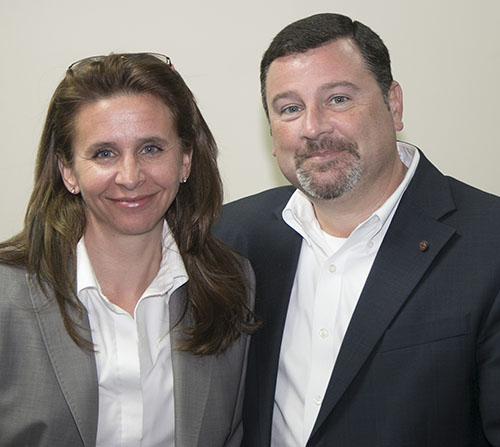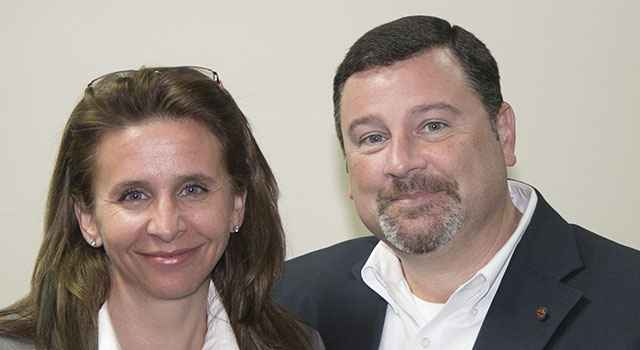By Ana Rodriguez Soto - Florida Catholic newspaper
MIAMI | Statistics tell a sad tale about marriage in the U.S.: Living together, up. Church weddings, down. Odds of divorce, holding steady between 40 and 50 percent.
And what’s true of the rest of the country is true in South Florida. The number of weddings performed in archdiocesan churches declined from 4,208 in 1972 to 1,883 last year. That’s across over 100 parishes in Miami-Dade, Broward and Monroe counties.
It mirrors a trend across the U.S. that saw the percentage of people who are legally married drop more than 50 percent from 1970 to 2010 — while the number of cohabiting couples increased 17-fold between 1960 and 2010.
Those figures, compiled for a National Marriage Project report called “The State of Our Unions: Marriage in America” (in 2011 and 2012), don’t even address the faith challenges posed by today’s marrying-age population.

Photographer: FILE PHOTO
Kari and Stephen Colella. She is executive director of Annunciation Ministries; he is cabinet secretary for Parish Life for the Archdiocese of Miami.
According to a 2015 Pew Research Center survey, only 30 percent of Catholics ages 18-29 attend Mass weekly. In a 2008 survey, Pew found that 40 percent of Catholics ages 18-29 did not believe that God is a person with whom they can have a personal relationship.
To address these concerns, the Archdiocese of Miami reviewed the state of Catholic marriage here, a review conducted most of last year in response to the second archdiocesan synod(2012-2014). The goal, in the words of Archbishop Thomas Wenski, is to “strengthen the vocation of marriage,” because strong marriages are good for families and society in general.
The new guidelines for marriage in South Florida churches were presented to archdiocesan priests at their September convocation. This is the first time in more than two decades that the archdiocese’s marriage guidelines have been updated. Among the changes:
- A recommended nine-month rather than six-month preparation period for engaged couples, beginning with meeting with the priest in the parish
- The adoption of Fully Engaged as the pre-marital questionnaire (see accompanying story)
- The adoption of Transformed in Love (for English-speakers) and Camino (for Spanish-speakers) as the approved group preparation programs for engaged couples
- The requirement that couples attend a course on Natural Family Planning, either in person, live online or self-paced online. This is the Church-approved method for discerning and planning your family, and it involves at least three classes taken over a period of three months.
- The addition of ongoing check-ins with the pastor or priest at specific points throughout the preparation process
- A new emphasis on making a parish connection and encouraging post-marriage enrichment so that the couple can remain active in the faith community after the wedding.
Priests and faith
Those last two are really the main difference, said Stephen Colella, director of theSecretariat for Parish Life in the archdiocese and co-chair of the Marriage Preparation Task Force commissioned by Archbishop Wenski. His wife, Kari Colella, executive director of Annunciation Ministries, served as co-chair. Before coming to Miami, the Colellas worked for the Archdiocese of Boston, where they helped to develop Transformed in Love.
“Marriage is a big entry point for evangelization. So we want to make this a thorough, welcoming process,” said Stephen, one that connects the couples to the parish and fosters their formation in the faith.
To do that, the relationship with the priest is key. In getting to know the couple, he can tweak the process so that it relates better to their lives. But it will be lay people — mentor couples — who carry out the preparation: administering the Fully Engaged inventory and speaking with the couple about it; running the Transformed in Love or Camino weekends; and teaching Natural Family Planning.
“It’s a new way of approaching it. Seeing marriage preparation as an opportunity to strengthen their relationship with the Church,” said Kari.
Rather than viewing marriage prep as jumping through a series of hoops, she uses the analogy of a train ride, with the priest hopping aboard at the first stop, checking in at the preparation stops along the way, and inviting the couple to stay on board after the ceremony.
“We want the priests to tell them, ‘Hey, it’s not over,” said Stephen.
“This is about building relationships and taking the opportunity,” Kari said. She noted that people in ministry spend countless hours trying to figure out a way to get others to come to church yet when engaged couples show up they sometimes feel unwelcome.
“The whole point is you walk them through and say, ‘Great. You’re here.’ Let me help you prepare for your wedding to help you stay married,” continued Stephen.
Happier couples
In their presentation to the priests, the Colellas cited statistics showing that couples who practice their faith are happier, and therefore more likely to stay married. In its 2011 report, the National Marriage Project found that putting “God at the center” of marriage increases happiness by 26 percent.
“The natural aspect (of marriage) is huge,” said Stephen. And most young people want their marriages to last.
But “we don’t know how to be married” anymore, said Kari, because of the culture and because divorce is so prevalent.
Combining solid marriage preparation with equally solid faith formation is the ultimate goal of the new guidelines, and one certainly in keeping with what Pope Francis wrote in Amoris Laetitia:
“The complexity of today’s society and the challenges faced by the family require a greater effort on the part of the whole Christian community in preparing those who are about to be married.” He suggested “grounding marriage preparation in the process of Christian initiation by bringing out the connection between marriage, baptism and the other sacraments.” (No. 206)
“We are so on track for implementing Amoris Laetitia,” said Stephen Colella.
‘Just one thing’
But it’s going to take priests and laity working together to form good Catholics for lifelong marriage. That’s why the archbishop has invited every pastor to select two couples to send to the marriage summit Saturday, March 25, from 12:30 to 8:30 p.m. at St. John Vianney College Seminary in Miami.
The goal of the summit, Archbishop Wenski wrote in his letter to pastors, “is to inspire married couples to become volunteer ‘Parish Marriage Missionaries’ by doing ‘just one thing’ to strengthen the vocation of marriage.”
At the summit, the couples will hear more about this new thrust in marriage preparation, meet other couples, gain insights and practical tools for their own marriage and ministry, and learn about the various ways they can get involved — from being a mentor couple for Fully Engaged to helping out at a Transformed in Love or organizing a post-marriage enrichment event, such as a couples’ “date night,” at their own church.
In doing so, the parishes will be carrying out another synod goal, Stephen Colella said. “Building up healthy marriage ministries all over the diocese.”
See related stories
- A marriage, not just a wedding: Premarital program helps archdiocesan couples become 'Fully Engaged'
- Two annulments and a wedding: After 23 years, couple marries sacramentally
- Marriage in groups: simple, elegant, affordable
- 'It's not about what's shiny': Young couple looks back to ancient betrothal to prioritize sacramental nature of marriage
- God and marriage: statistics on what keeps people happily married

